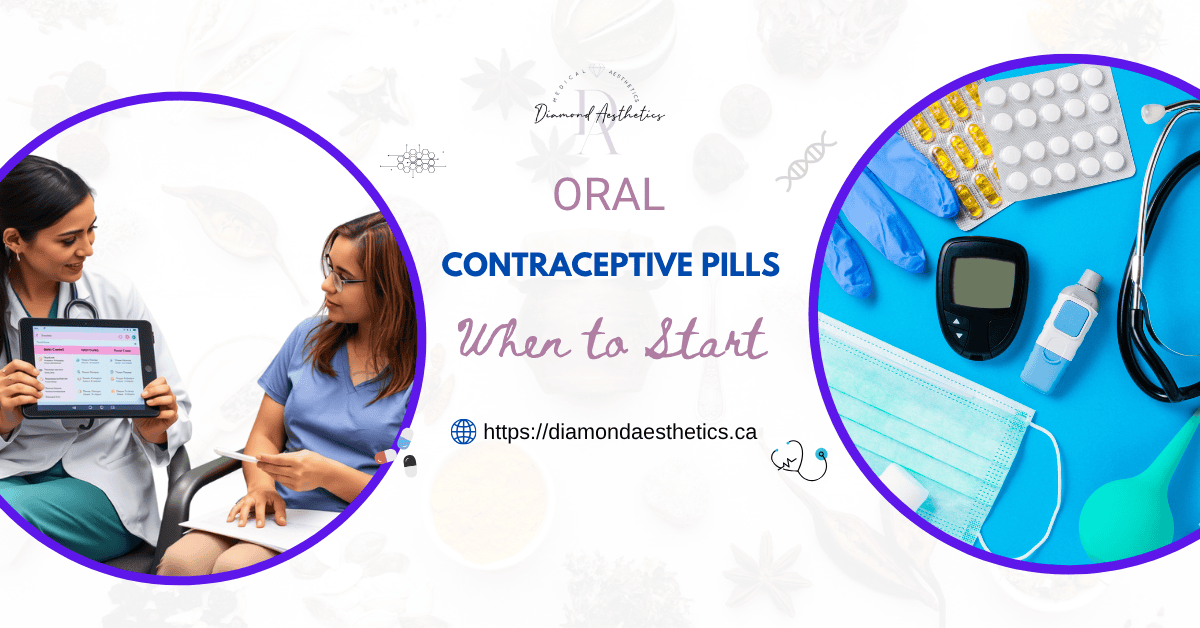Are you wondering when to start oral contraceptive pills and how to do so safely? You are not alone. Many people have questions about the best timing for beginning the pill, how it works, and what to expect. This comprehensive guide will answer all your questions from the 7-day rule to starting the pill without menstruation, helping you make an informed decision whether you’re new to birth control or switching methods.
What Are Oral Contraceptive Pills (OCPs)?
Oral contraceptive pills, commonly known as “the pill,” are a popular form of hormonal birth control. They come in two main types:
- Combined Oral Contraceptive Pill (COCP): Contains both estrogen and progestin.
- Progestogen-Only Pill (POP): Contains only progestin.
These pills prevent pregnancy by:
- Preventing ovulation
- Thickening cervical mucus to block sperm
- Thinning the uterine lining, making it harder for a fertilized egg to implant
OCPs are daily hormonal pills that prevent pregnancy by controlling ovulation, sperm movement, and implantation conditions.
Combined or Progestin-Only? Navigating Oral Contraceptive Options
There are two main types of oral contraceptive pills, each designed to meet different health needs and lifestyles. Understanding the difference can help you select the most suitable option for your body.
- Combined Oral Contraceptive Pills (COCPs) contain both estrogen and progestin, ideal for regulating periods, reducing acne, and offering broader cycle control.
- Progestin-Only Pills (POPs) contain only progestin, suitable for women who are breastfeeding or sensitive to estrogen, with a slightly stricter dosing schedule.
Both types have their benefits and potential side effects, so consulting your healthcare provider is essential.
When is the Best Time to Start Oral Contraceptive Pills?

The timing of when to start OCPs depends on your menstrual cycle, health status, and personal preferences. Here’s a breakdown of common methods:
1. Starting the Pill for the First Time
Not sure when to start taking birth control pills? Here are two common and trusted options to help you get started safely.
- Day 1 of Your Period:
The most common and recommended time to start is on the first day of your menstrual cycle (the day your bleeding begins). This method provides immediate protection against pregnancy. - Sunday Start:
Some people prefer to start on the first Sunday after their period begins. This helps align pill-free days with weekends. However, you’ll need to use backup contraception (like condoms) for the first 7 days.
Need to start right away, even if you’re not on your period? This method lets you begin immediately.
Why Starting on Day 1 Is Recommended
Starting on Day 1 ensures you are not ovulating, as ovulation usually occurs 10–14 days before your next period. This eliminates the need for backup contraception.
2. Starting the Pill at Any Time in Your Cycle
If you’re not on your period, you can still start the pill, but you’ll need to use backup contraception for the first 7 days. This is known as the 7-day rule.
Exceptions to the Rule
- Postpartum Individuals: If you’ve recently given birth, consult your healthcare provider. Breastfeeding mothers may need to wait about 3 weeks before starting COCP due to blood clot risks.
- After a Miscarriage or Abortion, You can start the pill immediately, as fertility returns quickly.
3. Starting the Pill Without Menstruation
If you’re not having a period (for example, due to amenorrhea or irregular cycles), talk to your healthcare provider. They may recommend:
- A pregnancy test to rule out pregnancy before starting OCPs
- Ultrasound or hormonal tests to diagnose underlying conditions like PCOS or thyroid disorders
Understanding the 7-Day Rule for Birth Control
The 7-day rule is important when starting or switching birth control pills. Here’s how it works:
- If you start the pill on Day 1 of your period, you’re protected from pregnancy immediately.
- If you start on any other day, you must use backup contraception (like condoms) for the first 7 days.
Why Does the 7-Day Rule Matter?
It takes about 7 days for the hormones in the pill to suppress ovulation and provide full contraceptive protection. Skipping this step increases the risk of unintended pregnancy.
When Do Birth Control Pills Start Working?
The timing of when you begin taking the pill affects how soon it will start protecting you from pregnancy:
- Starting on Day 1 of Your Period: Protection is immediate.
- Starting on Any Other Day: Protection begins after 7 consecutive days of pill use.
For instant protection, begin on the first day of your period. If you start later, use backup protection for the first 7 days.
How Effective Are Oral Contraceptive Pills?
The effectiveness of birth control pills depends on how consistently and correctly they are taken. Here’s a breakdown of their success rate under different conditions:
- Perfect Use: When taken every day at the same time without any mistakes, the pill offers near-complete protection.99% effective if taken exactly as directed. This means fewer than 1 out of 100 women will get pregnant in a year with perfect use.
- Typical Use: In reality, many users occasionally forget pills or take them at irregular times.
About 91% effective, accounting for missed pills or inconsistent timing. That means about 9 out of 100 women may become pregnant in a year with typical use.
With perfect use, the pill is extremely reliable. However, small mistakes can reduce its effectiveness, so consistency is key for the best protection.
Factors That Can Reduce Effectiveness
- Missing a pill by more than 12 hours (for COCP) or 3 hours (for POP)
- Drug interactions with medications such as antibiotics (Clarithromycin), anticonvulsants (Phenytoin), and antifungals (Ketoconazole)
Always inform your healthcare provider about any medications you take.
Can You Start the Pill at Any Time?
Yes, but remember the 7-day rule if you’re not starting on Day 1 of your period. It’s best to consult your healthcare provider to ensure the timing is right for you.
Scenarios Where Timing Matters
When starting oral contraceptive pills (OCPs), the timing matters depending on your situation:
- Switching From an IUD: Remove the IUD and start OCPs the same day.
- Postpartum or Post-Abortion: Start immediately to avoid gaps in protection.
- Irregular Cycles: Use a pregnancy test to confirm you’re not pregnant before starting.
Starting the pill correctly based on your situation helps ensure it works well and stays safe for you.
How to Take Oral Contraceptive Pills for the First Time

Starting birth control pills can feel overwhelming at first, but following a few simple steps can make it easy and effective. Here’s how to take oral contraceptive pills properly from the beginning.
- Choose the Right Time: Start on Day 1 of your period or follow the 7-day rule.
- Take One Pill Daily: Swallow the pill whole with water at the same time every day.
- Use Backup Contraception: If starting mid-cycle, use condoms for the first 7 days.
- Follow the Pack Instructions: Most packs have 21 active pills and 7 placebo pills (or a pill-free week).
- Set Reminders: Use alarms or apps like Clue or Natural Cycles to stay on track.
Always complete the pack and consult your doctor if you’re unsure about anything.
Switching Birth Control Methods: What to Know
If you’re switching from one method to another, keep these tips in mind:
- From one pill to another: Start the new pill the day after finishing the old pack (no break needed).
- From other methods (IUD, patch, etc.): Start the pill on the day you remove the previous method or as advised by your healthcare provider.
Avoid gaps between methods to maintain protection.
Common Side Effects and How to Manage Them

Some side effects may include:
When starting hormonal contraception like the pill, it’s common to experience mild side effects as your body adjusts. These often improve over time.
- Weight gain due to fluid retention or appetite changes
- Mood changes from hormonal fluctuations
- Breakthrough bleeding or spotting, especially in the first months
- Headaches or migraines triggered by hormones
It’s normal to experience mild side effects at first, but if they persist or worsen, speak with a doctor for guidance.
Managing Side Effects
When starting hormonal birth control, your body may need time to adjust. Here’s how to manage common issues:
- Take the pill with food to reduce nausea.
- Breast tenderness usually subsides after 2–3 months.
- Discuss alternatives if low libido is a concern.
Always consult your healthcare provider if side effects persist.
Can You Take Oral Contraceptive Pills with Certain Medical Conditions?
Certain conditions may affect pill use:
- Thrombophilia: Increased risk of blood clots. POP is safer than COCP.
- Hypertension: High blood pressure requires careful monitoring; non-hormonal options may be better if blood pressure is very high.
- Migraines with Aura: Estrogen pills may increase stroke risk; POP is usually preferred.
- Polycystic Ovary Syndrome (PCOS): OCPS can regulate cycles but may affect insulin resistance.
- Liver Disease: Conditions like cirrhosis may contraindicate estrogen use.
Always provide your full medical history to your provider.
FAQs About Starting Oral Contraceptive Pills
Can I start taking birth control pills right away?
Yes, you can start at any time using the quick-start method if you’re not pregnant. Use backup contraception for the first 7 days unless starting on the first day of your period.
Do I need to wait for my period to begin?
No. While starting during your period offers immediate protection, it’s not mandatory.
What is the 7-day rule?
It refers to the need for 7 days of active pills before full protection, unless you begin on day one of your period.
Can I skip the 7-day break between packs?
Yes, especially for controlling certain health conditions or avoiding your period, but consult your doctor first.
Which pills help with acne or PCOS?
Pills containing drospirenone or cyproterone acetate are often effective for managing acne and PCOS.
How soon do birth control pills start working?
If started on the first day of your period, they work immediately. Otherwise, protection starts after 7 days.
Trusted Guidelines from WHO, CDC, and FDA
Reliable organizations offer guidance on birth control safety:
- World Health Organization (WHO)
- Centers for Disease Control and Prevention (CDC)
- Universal Access to Contraception
These sources ensure that contraceptive methods meet safety and efficacy standards.
Final Thoughts: Start Smart, Stay Protected
Starting oral contraceptive pills is an important and personal health decision, one that should align with your cycle, medical needs, and lifestyle. Whether you’re beginning birth control for the first time or transitioning from another method, understanding proper timing and the 7-day rule can make all the difference in ensuring safe and effective use.
At Diamond Aesthetics, we don’t just provide answers, we offer personalized care. Our team is here to guide you through every step of your contraceptive journey with medical expertise, compassion, and confidentiality.
Have questions or need a prescription?
Book a virtual consultation with one of our healthcare professionals today. Your health, comfort, and confidence matter, and we’re here to help you take control.




